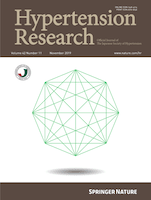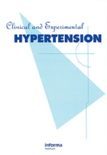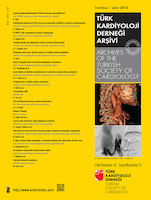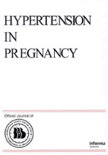
HYPERTENSION RESEARCH
Scope & Guideline
Advancing the understanding of hypertension.
Introduction
Aims and Scopes
- Pathophysiology of Hypertension:
Investigating the underlying biological mechanisms contributing to hypertension, including genetic, molecular, and environmental factors. - Clinical Management and Treatment Strategies:
Examining various treatment modalities for hypertension, including pharmacological interventions, lifestyle modifications, and emerging therapies such as renal denervation. - Epidemiological Studies:
Conducting population-based studies to assess the prevalence, risk factors, and outcomes associated with hypertension across different demographics. - Innovations in Diagnostic Techniques:
Exploring new methodologies for measuring blood pressure and related parameters, including home monitoring and advanced imaging techniques. - Hypertension and Comorbidities:
Studying the relationship between hypertension and other health conditions, such as diabetes, cardiovascular diseases, and renal dysfunction. - Public Health Implications:
Addressing the societal impact of hypertension, including prevention strategies, health policy implications, and healthcare resource management.
Trending and Emerging
- Digital Health and Telemedicine:
The rise of digital health technologies and telemedicine has become a focal point, exploring their roles in hypertension management, including remote monitoring and mobile health applications. - Genetic and Molecular Mechanisms:
There is a growing emphasis on understanding the genetic and molecular underpinnings of hypertension, particularly through the use of polygenic risk scores and biomarker studies. - Impact of Lifestyle on Hypertension:
Research is increasingly focusing on the interplay between lifestyle factors (diet, exercise, sleep) and hypertension, highlighting personalized approaches for prevention and management. - Hypertension in Special Populations:
Emerging themes include the study of hypertension in specific populations, such as pregnant women, children, and ethnic minorities, to better understand unique risk factors and treatment responses. - Integrated Care Models:
An increasing trend towards integrated care models that address hypertension in the context of comorbidities, emphasizing a holistic approach to patient management.
Declining or Waning
- Traditional Risk Factor Studies:
Research focusing solely on traditional risk factors for hypertension, such as age, gender, and obesity, has decreased as newer, more complex interactions are explored. - Basic Pharmacological Studies:
There has been a waning interest in purely pharmacological studies without a translational or clinical application, as the field moves towards integrative approaches that consider patient-specific factors. - Single-Country Studies:
Research limited to single-country populations is diminishing, with a trend towards multi-national or regional studies that enhance the generalizability of findings. - Static Treatment Guidelines:
The publication of static treatment guidelines is declining, reflecting a shift towards more dynamic, individualized treatment strategies that adapt to emerging evidence. - Focus on Non-Pharmacological Interventions:
The emphasis on non-pharmacological interventions alone has decreased, as the integration of lifestyle modifications with pharmacological treatments is increasingly recognized as essential.
Similar Journals

Clinica e Investigacion en Arteriosclerosis
Driving excellence in the understanding of cardiovascular diseases.Clinica e Investigacion en Arteriosclerosis is a premier academic journal dedicated to the field of cardiology and cardiovascular medicine, published by ELSEVIER. With its ISSN 0214-9168 and E-ISSN 1578-1879, the journal aims to disseminate high-quality research and innovations in the understanding and treatment of arterial diseases, contributing significantly to both clinical practices and pharmacological advancements. Established in 2007 and continuing into 2024, the journal has garnered recognition with a notable Q3 categorization in both Cardiology and Cardiovascular Medicine and Pharmacology (medical) for 2023, reflecting its impact in the academic community. Researchers and healthcare professionals utilizing this journal will find a diverse range of articles exploring novel therapeutic strategies and epidemiological data, making it an essential resource for advancing knowledge and practice in cardiovascular health. While it does not operate as an open-access journal, the findings published in Clinica e Investigacion en Arteriosclerosis are pivotal for understanding current trends and future directions in cardiovascular research.

CLINICAL AND EXPERIMENTAL HYPERTENSION
Advancing knowledge in hypertension management.Clinical and Experimental Hypertension, published by Taylor & Francis Inc, is a crucial resource in the fields of internal medicine and physiology. With its inaugural publication dating back to 1978, this esteemed journal has successfully merged decades of research, providing a platform for the latest advancements in hypertension studies. Operating without an open access model, it is configured to serve a specialized audience of researchers, clinicians, and students who are dedicated to exploring innovative treatment modalities and understanding the complexities of hypertensive diseases. Ranked in the Q3 category in both Internal Medicine and Physiology, this journal accomplishes a commendable standing in the academic community, exemplified by its Scopus rankings which position it within the median percentile range in its field. By disseminating high-quality research and fostering scientific dialogue, Clinical and Experimental Hypertension plays a pivotal role in shaping contemporary understanding and clinical practices concerning hypertension management.

Turk Kardiyoloji Dernegi Arsivi-Archives of the Turkish Society of Cardiology
Driving evidence-based practices in cardiology.Turk Kardiyoloji Dernegi Arsivi-Archives of the Turkish Society of Cardiology is a prominent peer-reviewed journal dedicated to advancing the field of cardiology and cardiovascular medicine. Published by KARE PUBL, this journal has established itself as a key resource for researchers, healthcare professionals, and students since its inception in 1990. As an Open Access journal since 2017, it ensures that cutting-edge research and clinical findings are readily accessible to a global audience, thus fostering collaboration and knowledge sharing among the cardiology community. With its recent rank in the Q3 quartile for Cardiology and Cardiovascular Medicine in 2023, and a Scopus rank of #282 out of 387, the journal is positioned to enhance its influence in the cardiovascular field, offering valuable insights and promoting evidence-based practices. The journal covers a wide range of topics within cardiology and cardiovascular research, making it an essential platform for scholars aiming to contribute to the ongoing dialogue in this vital area of medicine. For those eager to stay updated with the latest research trends and clinical practices in cardiology, Turk Kardiyoloji Dernegi Arsivi represents a crucial resource.

Cardiovascular Diagnosis and Therapy
Exploring New Frontiers in Cardiovascular Diagnosis and TherapyCardiovascular Diagnosis and Therapy, an esteemed journal in the field of Cardiology and Cardiovascular Medicine, is published by AME PUBLISHING COMPANY, based in Hong Kong, China. With an ISSN of 2223-3652 and an E-ISSN of 2223-3660, this open-access journal aims to present cutting-edge research that significantly advances diagnostic and therapeutic practices in cardiovascular health. Recognized for its impact, it holds a 2023 category quartile ranking of Q2 and is positioned at rank #124 out of 387 in Scopus, reflecting its noteworthy contribution to medical literature with a percentile of 68th. The journal welcomes contributions that span various aspects of cardiovascular research, including clinical trials, epidemiological studies, and innovative therapeutic approaches, making it a vital resource for researchers, practitioners, and students alike, committed to improving cardiovascular care.

HYPERTENSION IN PREGNANCY
Transforming Maternal Care through Open Access ResearchHYPERTENSION IN PREGNANCY is a leading academic journal dedicated to the critical study of hypertensive disorders during pregnancy, a crucial area of maternal and fetal health. Published by Taylor & Francis Inc, this journal boasts an Open Access policy since 2023, ensuring that research findings are freely accessible to a global audience. With an ISSN of 1064-1955 and E-ISSN of 1525-6065, it offers a platform for high-quality research and review articles since its inception in 1982. The journal holds a Q3 category ranking in both Internal Medicine and Obstetrics and Gynecology, reflecting its reputable standing within the scientific community. As of 2023, it ranks among the top quartile publications in its field, with Scopus ranking it 86/209 in Obstetrics and Gynecology and 83/167 in Internal Medicine. This journal aims to foster dialogue among researchers, clinicians, and policymakers regarding the management and implications of hypertension in pregnancy, promoting advancements in care and research methodologies. Located in Philadelphia, PA, it continues to be an invaluable resource for those invested in improving maternal health outcomes and advancing the field.

Metabolic Syndrome and Related Disorders
Exploring the Interconnections of Metabolic HealthMetabolic Syndrome and Related Disorders is an esteemed journal published by MARY ANN LIEBERT, INC, focusing on the multifaceted aspects of metabolic syndrome, including its interaction with chronic diseases such as diabetes, cardiovascular conditions, and obesity. Since its inception in 2003, this journal has established itself as a vital resource for researchers, healthcare professionals, and students dedicated to advancing knowledge in the fields of endocrinology, internal medicine, and metabolic disorders. With an impact factor reflective of its academic significance, Metabolic Syndrome and Related Disorders is recognized within the Q2 and Q3 quartiles in its respective categories, solidifying its reputation among scientific and clinical communities. Although it does not currently offer open access options, the journal remains committed to disseminating high-quality research and reviews that foster innovative solutions and improve patient outcomes. The journal's gradual convergence towards 2024 presents an exciting opportunity for continued exploration and dialogue about metabolic-related health challenges.

Arterial Hypertension
Exploring the frontiers of arterial hypertension research.Arterial Hypertension is a dedicated Open Access journal published by VIA MEDICA, with the ISSN 2449-6170 and E-ISSN 2449-6162, focusing on the multidisciplinary field of cardiology, endocrinology, and internal medicine. Established in Poland, this journal has been providing researchers and healthcare professionals with accessible, high-quality content since its inception in 1999. With a commitment to advancing knowledge in the management and treatment of arterial hypertension, it publishes significant research findings, clinical trials, and reviews that contribute to improved health outcomes. Though classified in Q4 across various relevant categories, the continuous improvement in its content ensures its relevance in an evolving medical landscape. Designed to facilitate collaboration and innovation, Arterial Hypertension serves as a crucial resource for anyone invested in cardiovascular health, encouraging open dialogue and dissemination of vital research within the scientific community.

Cardiology Research and Practice
Elevating the standards of cardiology research and practice.Cardiology Research and Practice is a leading academic journal dedicated to advancing knowledge in the fields of cardiology and cardiovascular medicine. Published by HINDAWI LTD, this journal has been an inclusive platform for open access research since 2009, facilitating the dissemination of high-quality studies that contribute to the global scientific community. With an impact factor placing it in Q2 of its category in 2023, it underscores its importance in delivering innovative insights and discoveries that shape clinical practices and policies. The journal covers a broad scope of topics including, but not limited to, cardiovascular disease prevention, innovative treatment modalities, and emerging technologies, appealing to researchers, healthcare professionals, and students alike. Located in the United States with its international reach, Cardiology Research and Practice serves as a critical resource for those dedicated to improving patient outcomes and advancing the field of cardiology.

JOURNAL OF HUMAN HYPERTENSION
Exploring the critical dimensions of hypertension and health.JOURNAL OF HUMAN HYPERTENSION, a prominent publication in the field of internal medicine, is dedicated to advancing the understanding of hypertension and its implications for human health. Published by SPRINGERNATURE in the United Kingdom, this esteemed journal has been a vital resource for researchers and clinicians since its inception in 1987, with a continuous commitment to disseminating high-quality, peer-reviewed research. With an impressive Q2 category rank in Internal Medicine and a Scopus rank of 53 out of 167, it occupies a crucial position within the academic community, reaching a 68th percentile ranking that underscores its significance. The journal aims to provide a platform for innovative studies and reviews, fostering knowledge that bridges basic science, clinical practice, and public health. Although it does not currently offer open access, it remains accessible through institutional subscriptions, ensuring that vital information about hypertension is available to a broad spectrum of healthcare professionals and researchers. Explore the critical findings and groundbreaking research published in the JOURNAL OF HUMAN HYPERTENSION to stay at the forefront of hypertension studies.

International Journal of Hypertension
Innovating solutions for better cardiovascular outcomes.The International Journal of Hypertension, published by HINDAWI LTD, is a pivotal open-access journal dedicated to advancing knowledge in the field of hypertension and cardiovascular health. Since its inception in 2010, the journal has provided a vital platform for researchers, clinicians, and students to disseminate innovative findings and comprehensive reviews spanning various aspects of hypertension management, pathophysiology, and epidemiology. Residing in Q3 of the Internal Medicine category and ranked 75 out of 167 in the Scopus rankings, it reflects a commitment to quality and relevance in medical research. With a global reach, the journal aims to foster collaboration and knowledge exchange, contributing significantly to the scientific community's efforts to combat hypertension-related health issues. Accessible since 2010, this journal exemplifies the principles of open science, ensuring that critical research is available to all stakeholders in the field.